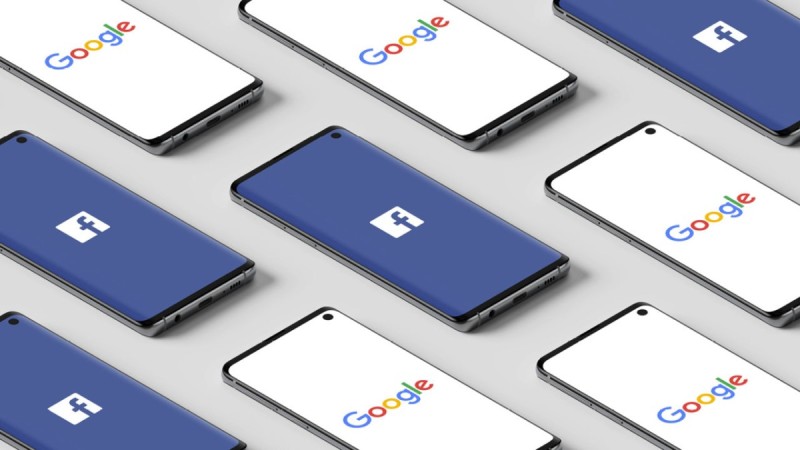The myth of Google and Facebook’s online advertising ‘monopoly’
Publishers are using hypocritical tactics to persuade Ottawa to force Google and Facebook to compensate them

The newspaper charge of monopoly against tech giants like Google and Facebook is laughable since they obviously have competitors, writes Marc Edge. Illustration courtesy Raconteur.
Newspaper publishers complain that Google and Facebook are taking the advertising that used to go to them and claim that the tech giants are therefore a monopoly. This is the height of hypocrisy since the business model of newspapers for the past half century or so has been government-sanctioned monopoly. The simple fact is instead that nobody can monopolize the Internet, which allows for infinite competition because of its lack of barriers to entry. I suspect it is the very fact of competition that newspapers object to, since they’ve been doing their best for years to get rid of it in print. Now that they are moving to online publication, they are crying foul because they are finally having to compete on a level playing field. They have even now prevailed upon Ottawa, which for years turned a blind eye as publishers eliminated print competition, to pass Bill C-18, the Online News Act, which would force Google and Facebook to pay a portion of their revenues to newspapers. Something just doesn’t smell right here.
The best summary I have found of the tech monopoly charge is in the UK, where the industry publication Press Gazette began a campaign in 2017 to stop Google and Facebook from what it called “destroying” journalism. Its campaign has been against what it more correctly calls the “Duopoly” of tech company dominance. A monopoly is one seller, a duopoly is two sellers, and an oligopoly is a few sellers. Perfect competition would ideally be found on the other end of the scale with many sellers, which in fact is what you find on the Internet. A monopoly is best for business, however, because it can then set prices as high as it wants in order to maximize profits. Even a duopoly can be highly lucrative if the two sellers co-operate instead of compete. Same with an oligopoly, as we have seen with banks, oil companies, and now supermarkets. Competition is much better for consumers, who can then pick and choose what they want based on price and/or quality.
Press Gazette’s campaign puts the charge very simply. “Imagine if two news publishers dominated digital media in the way that Facebook and Google do,” it asked. “The Government would not allow such a duopoly to stand. Campaigners would call for them to be broken up in the name of media plurality.” Those last two words might not have much meaning here in Canada, but the UK and some other countries have rules for media mergers and acquisitions which won’t allow them if they result in market dominance. No such problem exists for newspapers in Canada, where they have been allowed by the federal Competition Bureau to buy up competitors at will and then simply close them. I call it the Prevention of Competition Bureau, because it looked the other way for years as the two dominant newspaper chains out west where I live bought, sold, and even traded competing publications back and forth, then closed them to create more lucrative monopoly markets. It worked so well that Torstar and Postmedia did the same thing in Ontario, trading 41 titles in 2017 and closing 36 of them.
The Prevention of Competition Bureau was finally roused to action when a whistleblower came forward to contradict claims by the chains that they had no idea the other planned to close the newspapers it acquired. PCB officers in uniform (it is a law enforcement agency, after all, just like the RCMP) even raided their corporate headquarters, and found such incriminating evidence as non-compete agreements and memos outlining closure plans. As a result, the chains faced possible criminal charges of monopoly and conspiracy to eliminate competition, which carry maximum fines of $25 million and prison sentences of up to 14 years. In a time-honoured tradition, however, the PCB simply waited until everybody had forgotten about it and then, despite all the evidence, quietly dropped the whole thing.
The newspaper charge of monopoly against the tech giants, on the other hand, is laughable since they obviously have competitors. In the search engine business, there’s Yahoo!, which is terrible. I just wish I could figure out how to change it as my browser’s default search engine, since I have to re-do any Yahoo! search I unwittingly order and I invariably get more thorough results on Google. Then there’s Bing, which Microsoft launched a decade ago as competition for Google but is still trailing it in popularity by a wide margin. That’s because Google simply works better. Through its massive investment in hardware (the servers it needs to keep up with the massive demand for its free service) and software (the algorithm it uses to scour the Internet and find out where everything is), Google has perfected search, and at lightning speed. The result has been enormous popularity, which newspaper publishers have somehow mistaken for monopoly. The backlash against Google seems to be mostly a result of its business practices, which have seen it dominate the Internet. It has cleverly re-invested much of its massive profits in buying up anything online that might possibly make money in the future, such as YouTube, which due to its enormous server costs only recently began to turn a profit.
Then there’s Facebook, which similarly surpassed competitors to prove the most popular social network. Who can forget MySpace, which Rupert Murdoch bought for US$580 million in 2005, only to see its popularity plummet because people didn’t want to patronize a megalomaniac media mogul, kind of like what is happening right now with Twitter. Murdoch has been behind the worldwide campaign against Google and Facebook through newspapers he owns in the UK, the US and his native Australia, which was the first country to force them to pay up. We don’t allow foreign media moguls into Canada, of course, but the newspaper lobby here has been doing a pretty good job of pushing Murdoch’s campaign.
At the root of it all, of course, is the money that Google and Facebook have been making as a result of their popularity. Through the vast amounts of data they have been able to collect on their users and members, respectively, they have been able to offer online advertising targeted very closely to our interests. That’s something newspapers can’t compete with, so to them it must be a monopoly. The best part is how publishers have pointed to the newspapers they have killed off themselves to stifle competition, blamed it on a tech monopoly, and then used their political power to persuade Ottawa to force Google and Facebook to compensate them. The hypocrisy, not to mention the gullibility, is stunning.
Marc Edge is a journalism researcher and author who lives in Ladysmith, BC. His books and articles can be found online at www.marcedge.com.










